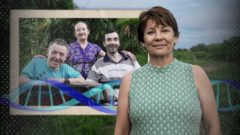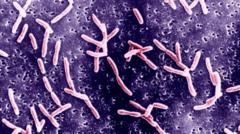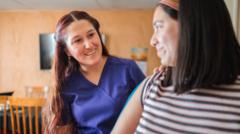Residents of Serrinha dos Pintos received vital health insights after decades of uncertainty regarding a rare genetic disease linked to their family ties.
**The Genetic Mystery of Serrinha dos Pintos: How Cousin Marriages Affect Health**

**The Genetic Mystery of Serrinha dos Pintos: How Cousin Marriages Affect Health**
A groundbreaking study shines light on Spoan syndrome in a tight-knit Brazilian community.
In the remote town of Serrinha dos Pintos, nestled in northeastern Brazil, the seemingly unremarkable lives of fewer than 5,000 residents are intricately tied to a rare genetic disorder. Over two decades ago, biologist and geneticist Silvana Santos discovered Spoan syndrome, a debilitating condition that affects the nervous system, leaving many children unable to walk. This community, where familial connections run deep—many residents are cousins—had long been in the dark about the reasons for their health struggles.
Before Santos's pivotal arrival, families faced the heartache of watching their children lose mobility without understanding the underlying cause. Santos's research not only identified the genetic mutation responsible for Spoan, but also provided a crucial diagnosis for the affected families, earning her recognition as one of the BBC's 100 most influential women in 2024.
Santos's connection to Serrinha was personal; many of her São Paulo neighbors were originally from the town and were distantly related to its residents. Her investigation revealed that over 30% of couples in Serrinha were related, a situation that exacerbates the risk of genetic disorders in their offspring.
The incidence of cousin marriages is increasing by the year in Serrinha, where geographical isolation prevails. With statistics indicating that about 5-6% of children born to cousins may face genetic disorders, understanding these risks is critical. Santos conducted extensive research, ultimately narrowing down the mutation to a specific chromosomal loss seen in their DNA.
Years of fieldwork transformed Santos's understanding of the syndrome, which she named after the town. One heartbreaking narrative involves farmer Lolô, who cared for his daughter Rejane, afflicted with Spoan, while reflecting on the dangers of their shared lineage.
Despite her research showing a link to early European settlers in Brazil, the community grapples with the ramifications of the genetic condition. Increased awareness and medical support have redirected the conversation around Spoan—down from derogatory terms to a respectful acknowledgment of patients' needs.
Today, Santos's work continues with a new initiative to screen 5,000 couples for hereditary conditions, aiming to equip them with knowledge about genetic risks, without prompting a deterrent in cousin marriages. Through education, she hopes to foster a deeper understanding within the community while maintaining the essential familial bonds that define life in Serrinha dos Pintos.
As Santos visits the town, she is greeted with affection, her legacy interwoven with the fabric of a community navigating the complexities of love, family, and health.
Before Santos's pivotal arrival, families faced the heartache of watching their children lose mobility without understanding the underlying cause. Santos's research not only identified the genetic mutation responsible for Spoan, but also provided a crucial diagnosis for the affected families, earning her recognition as one of the BBC's 100 most influential women in 2024.
Santos's connection to Serrinha was personal; many of her São Paulo neighbors were originally from the town and were distantly related to its residents. Her investigation revealed that over 30% of couples in Serrinha were related, a situation that exacerbates the risk of genetic disorders in their offspring.
The incidence of cousin marriages is increasing by the year in Serrinha, where geographical isolation prevails. With statistics indicating that about 5-6% of children born to cousins may face genetic disorders, understanding these risks is critical. Santos conducted extensive research, ultimately narrowing down the mutation to a specific chromosomal loss seen in their DNA.
Years of fieldwork transformed Santos's understanding of the syndrome, which she named after the town. One heartbreaking narrative involves farmer Lolô, who cared for his daughter Rejane, afflicted with Spoan, while reflecting on the dangers of their shared lineage.
Despite her research showing a link to early European settlers in Brazil, the community grapples with the ramifications of the genetic condition. Increased awareness and medical support have redirected the conversation around Spoan—down from derogatory terms to a respectful acknowledgment of patients' needs.
Today, Santos's work continues with a new initiative to screen 5,000 couples for hereditary conditions, aiming to equip them with knowledge about genetic risks, without prompting a deterrent in cousin marriages. Through education, she hopes to foster a deeper understanding within the community while maintaining the essential familial bonds that define life in Serrinha dos Pintos.
As Santos visits the town, she is greeted with affection, her legacy interwoven with the fabric of a community navigating the complexities of love, family, and health.








